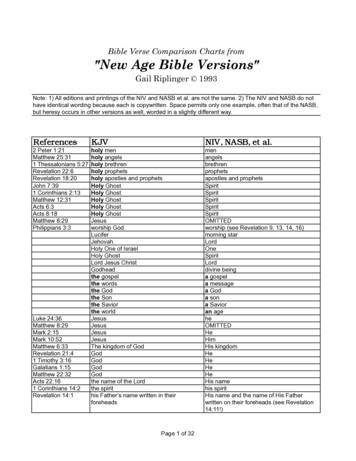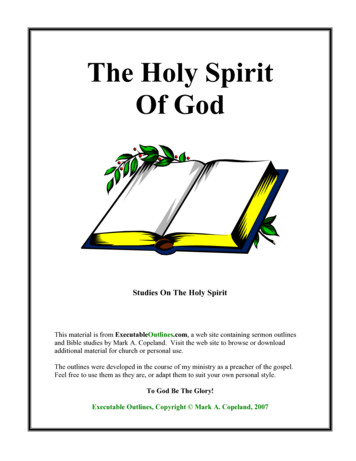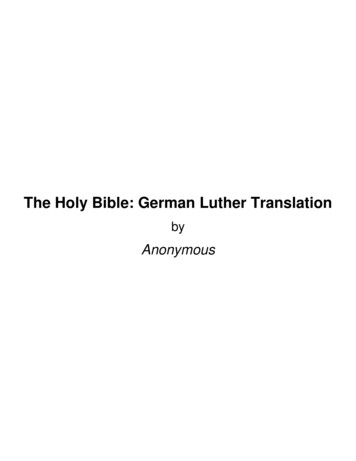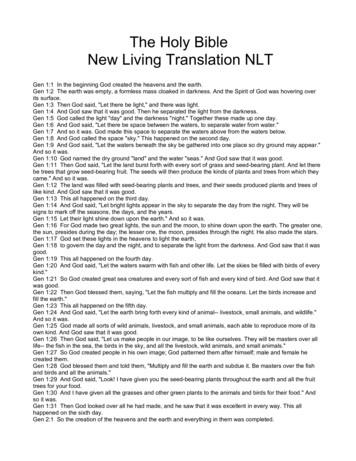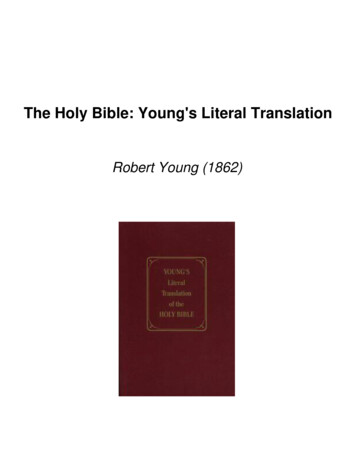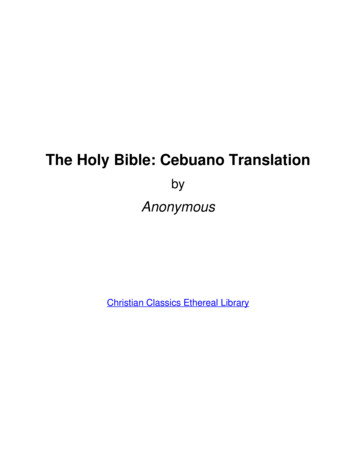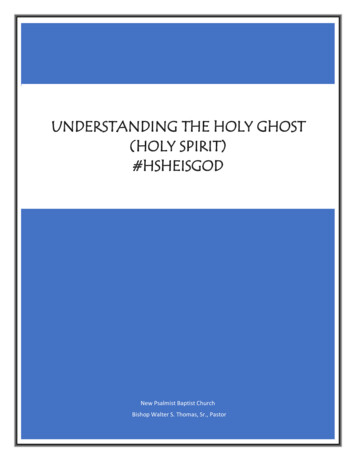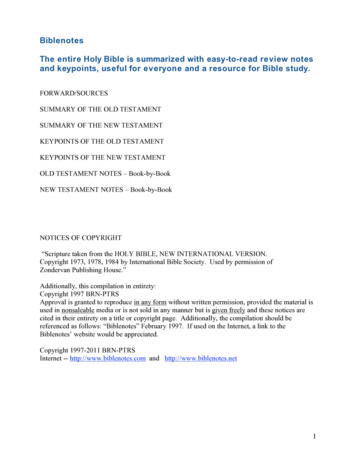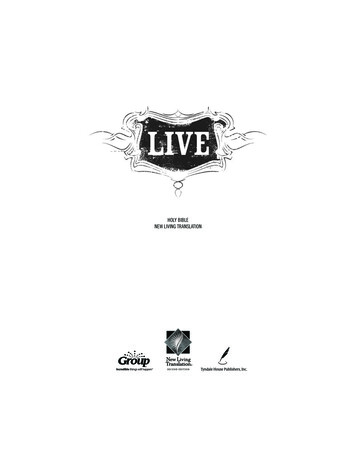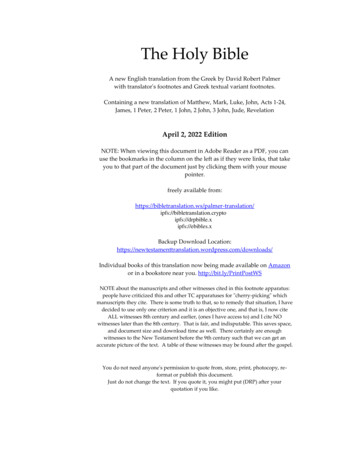
Transcription
The Holy BibleA new English translation from the Greek by David Robert Palmerwith translator's footnotes and Greek textual variant footnotes.Containing a new translation of Matthew, Mark, Luke, John, Acts 1-24,James, 1 Peter, 2 Peter, 1 John, 2 John, 3 John, Jude, RevelationApril 2, 2022 EditionNOTE: When viewing this document in Adobe Reader as a PDF, you canuse the bookmarks in the column on the left as if they were links, that takeyou to that part of the document just by clicking them with your mousepointer.freely available pfs://ebibles.xBackup Download .com/downloads/Individual books of this translation now being made available on Amazonor in a bookstore near you. http://bit.ly/PrintPostWSNOTE about the manuscripts and other witnesses cited in this footnote apparatus:people have criticized this and other TC apparatuses for "cherry-picking" whichmanuscripts they cite. There is some truth to that, so to remedy that situation, I havedecided to use only one criterion and it is an objective one, and that is, I now citeALL witnesses 8th century and earlier, (ones I have access to) and I cite NOwitnesses later than the 8th century. That is fair, and indisputable. This saves space,and document size and download time as well. There certainly are enoughwitnesses to the New Testament before the 9th century such that we can get anaccurate picture of the text. A table of these witnesses may be found after the gospel.You do not need anyone's permission to quote from, store, print, photocopy, reformat or publish this document.Just do not change the text. If you quote it, you might put (DRP) after yourquotation if you like.
This page intentionally blank for printing purposes.
MatthewThe Good News According toMATTHEWChapter 1The Genealogy of Jesus¹A record of the genealogy of Jesus1 the Christ, the son of David, the sonof Abraham:²Abraham begot Isaac,and Isaac begot Jacob,and Jacob begot Judah and his brothers,³and Judah begot Perez and Zerah,by Tamar,and Perez begot Hezron,and Hezron begot Ram,⁴and Ram begot Amminadab,and Amminadab begot Nahshon,and Nahshon begot Salmon,⁵and Salmon begot Boaz, by Rahab,and Boaz begot Obed, by Ruth,and Obed begot Jesse,⁶and Jesse begot David the King.David2 begot Solomon, by her who belonged to Uriah,⁷and Solomon begot Rehoboam,and Rehoboam begot Abijah,and Abijah begot Asa,31:1 Greek, Ἰησοῦς (Iēsoȗs), "Yaysoos," from the Hebrew ( יֵׁשּוע yēšûʿa) "Yayshua," whichwas a later form of the Hebrew name of Joshua, ( יְ ֹהוׁשּוע yəhōšȗʿa) "Y'hoshua." Y'hoshuain turn had developed by vowel dissimilation from the original Yəhoshua. Yeshua mans"salvation."21:6 txt Δαυὶδ δὲ ¹ ℵ B itk vgmss syrs,c,p copsa,bo arm Did NA27 {\} ‖ Δαυὶδ δὲ ὁ βασιλεὺς C E LW lat syrh geo (TR Δαβὶδ) RP ‖ lac A D N P.31:7-8 txt Ἀσα L W Σ it(a),f vg syrc,s,p,h,pal Ps-Eustathius (Epiphanius½) TR HF RP ‖ Ἀσαφ ¹ ℵ BC* (DLuke) itaur,(dLuke),k,q vgmss (syrhmg) copsa,meg,bo arm eth geo (Epiphanius½); Ambrose NA27 {B} ‖lac ⁴⁵ A D N P Φ. In the genealogy in I Chronicles 3:10 most Greek manuscripts read Ἀσα,though MS 60 reads Ἀσαβ. In Antiquities VIII.XI.3—xii.6 Josephus uses Ἀσανος, though inthe Latin translation Asaph appears. The man's name, of course, was Asa. Is it not writtenin the annals of the kings of Israel and Judah? This variant is not a big deal, since Asaphappears to be just a variant spelling of Asa; probably as a result of passing through differentlanguages. The New Testament has many examples of this phenomenon. A Hebrew wordcannot end in a vowel, so I suspect that the glottal stop consonant which ends the Hebrewname was substituted with some other consonant in other languages. In Hebrew, the nameAsa begins and ends with the letter ℵ (Aleph), which is a consonant, a glottal stop. Otherlanguages, (including Greek) which do not have a letter for the glottal stop, substitutedother consonants for it. The confusion of terminal glottal stops with other unvoiced1
Matthew⁸and Asa begot Jehoshaphat,and Jehoshaphat begot Joram,and Joram begot Uzziah,⁹and Uzziah begot Jotham,and Jotham begot Ahaz,and Ahaz begot Hezekiah,¹⁰and Hezekiah begot Manasseh,and Manasseh begot Amon,4and Amon begot Josiah,¹¹and Josiah begot Jeconiahand his brothers at the time ofthe exile to Babylon.¹²After the exile to Babylon:Jeconiah begot Shealtiel,and Shealtiel begot Zerubbabel,¹³and Zerubbabel begot Abiud,and Abiud begot Eliakim,and Eliakim begot Azor,¹⁴and Azor begot Zadok,and Zadok begot Akim,and Akim begot Eliud,¹⁵and Eliud begot Eleazar,and Eleazar begot Matthan,and Matthan begot Jacob,¹⁶and Jacob begot Joseph,the husband5 of Mary,of whom6 was born Jesus,the one called the Christ.consonants happens often in English as well, since English has no letter for the glottal stop.(Though in transliteration schemes, the single straight apostrophe is used to represent theglottal stop.) In very ancient Greek, the letter φ was pronounced like our letter p, it wasnot an "f." In English today, words ending in p often sound like they end in a glottal stop.That is, we do not aspirate the p as we would if the p was in the middle of a word, butsimply shut off the exhaled air by closing our lips.41:10 txt Ἀμών, Ἀμὼν E L W Σ it(a) vg(mss) syrc,s,p,h,pal copmeg (Ps-Eustathius); Augustine TR HFRP ‖ Ἀμμών, Ἀμμὼν itaur,f ‖ Ἀμνων, Ἀμως B* ‖ Ἀμώς, Ἀμὼς ℵ Bc C (DLuke) itc,dLuke),ff¹,k,q vgmss(syrhmg) copsa,bo,fay arm eth geo Epiphanius; Ambrose NA27 {B} ‖ lac ⁴⁵ A D N P Φ. In the LXXof 1 Chron. 3:14, most manuscripts read Ἀμων, but A Bc read Ἀμως, and B* and oneminuscule read Ἀμνων. Further, in 2 Kings 21:18, 19, 23-25 and 2 Chronicles 33:20-25,several Greek manuscripts read Ἀμως. It is admitted by almost all that Ἀμως is an error,whether by LXX scribes, Matthew, or another scribe.51:16a See the endnote at the end of this document comparing this genealogy to Luke'sgenealogy.61:16b τὸν ἄνδρα Μαρίας, ἐξ ἧς ἐγεννήθη Ἰησοῦς ὁ λεγόμενος Χριστός is the reading of ¹ℵ B C E P L W Σvid itaur,f vg syrp,h,pal copsa (arm) (eth) geo TR HF RP NA27 {A} ‖ lac ⁴⁵ A D N Φ.Other witnesses, Θ ƒ¹³ ℓℓ547 and some Italic, Syriac and Coptic versions add various wordsand phrases in order to clarify the ambiguity of whether Matthew was saying that Jesus wasbegotten of Joseph, or of Mary. But the original wording can be properly understood asmeaning born of Mary. It should also be mentioned that two Hebrew Matthew manuscriptshave been found by Jewish textual scholar Nehemia Gordon which say here that thisgenealogy is of the "father" of Mary.
Matthew¹⁷Thus there were fourteen generations in all from Abraham toDavid, fourteen from David to the exile to Babylon, and fourteen from theexile to the Anointed One.7The Birth of Jesus¹⁸This is how the birth 8 of Jesus Christ came about. His motherMary was pledged to be married to Joseph, but before they consummated,she was found to be pregnant, from the Holy Spirit. ¹⁹But her husbandJoseph, being a righteous man, did not want to make an example of her, andplanned to divorce her secretly.²⁰But while he was mulling these things over, an angel of the Lordappeared to him by means of a dream, and said, "Joseph son of David, donot be afraid to take Mary home as your wife, for what is conceived in her isby the Holy Spirit. ²¹She will give birth to a son, and you are to call hisname Jesus, because he will save his people from their sins."9²²All this took place in order that what was said by the Lordthrough the prophet would be fulfilled, which says: ²³"Behold, the virginshall be pregnant, and shall bear a son, and they shall call his nameImmanuel,"10 which when translated is, "God with us."²⁴And when Joseph awoke from his sleep, he did what the angel ofthe Lord had commanded him, and he took his bride home. ²⁵But he did notknow her11 until she gave birth to her firstborn son.12 And he called his1:17 Matthew skips after Josiah, Jehoiakim and Jehoiachin (2 Kings 23:34 - 24:6). And hislast set of generations are only 13, not 14. So this arrangement must be a teaching ormemorization aid. Another interesting thing is that fourteen plus fourteen plus fourteenequals six groups of seven generations, 42 in all (6 sevens). In Hebrew, in the OldTestament, a group of seven of something is called a week of something. There were sixweeks of generations prior to the Messiah, and the Messiah ushered in the seventh week,the Sabbath week of generations. The Messiah brought in another rest from creation. AsGod took six days to create the First Adam, and then he ceased, so God also took six weeksof generations to create the Second Adam, and then he ceased.81:18 txt γένεσις ¹ ℵ B (C W γενεσεις) L (P γένησις) Z Σ arm Euseb Ps-Ath NA27 {B} ‖γέννησις E L ita,aur,b,d,f,k,q vg IrenGr Or Didydub Epiphan Chrysost Theodotus-AncyraNestorius; Chromat Jer Aug TR HF RP ‖ lac ⁴⁵ A D N Φ.91:21 The Greek name, Ἰησοῦς (Iēsoȗs), came from the Hebrew ( יֵׁשּוע yēšûʿa)"Yayshua,"which was a later form of the Hebrew name of Joshua, ( יְ ֹהוׁשּוע yəhōšȗʿa) "Y'hoshua."Yeshua means "salvation."101:23 Isaiah 7:14111:25a "Did not know her" is a euphemism meaning, "he did not have sex with her."121:25b txt τόν υἱόν αὐτής τὸν πρωτότοκον C Dc (D* L itd,q omit αὐτής) E N W Σ 087 itaur,f,ff¹ vgsyrp,h,palmss arm eth Diatesaron Cyril-Jerusalem Didymus Didymusdub Epiphanius ChrysostomProclus; Jerome Augustine ΤR HF RP ‖ υἱόν ℵ B Zvid 071vid (copsa υἱόν αὐτής) itb,k syrs,c,palmss(copbo τόν υἱόν) copmeg geo Ambrose Chromatius NA27 {A} ‖ lac ⁴⁵ A P Φ. Adding thewords τόν before the word υἱόν, "son," and "her firstborn son," as all manuscripts have inLuke 2:7, would help clarify that sexual intercourse, brought up here, did not take placebefore Mary's firstborn. Yet, adding “firstborn son” still does not make it clear that she had not already had adaughter. It is much easier to explain why the words "her firstborn son" might have beenadded, than to explain why they might have been deleted. The story, regardless, still7
Matthewname Jesus.Chapter 2The Visit of the Magi¹Now after Jesus had been born in Bethlehem of Judea, in the daysof King Herod, behold, Magi 13 from out of the east showed up in Jerusalem,²saying, "Where is the one born king of the Jews? For we saw his star in theeast14 and have come to worship him."³Upon hearing this, King Herod was disturbed, and all Jerusalemwith him. ⁴And having assembled all the chief priests and Torah scholars ofthe people, he inquired of them as to where the Messiah was to be born.⁵And they told him, "In Bethlehem in Judea, for this is what hasbeen written through the prophet:⁶" 'And you, Bethlehem, in the landof Judah,are by no means least amongthe rulers of Judah;for out of you will come a rulerwho will be the shepherd ofmy people Israel.'15"makes clear that Jesus was her firstborn, and that Mary was a virgin prior to the time ofJesus being born.132:1 Plural of Magus, one trained in astrology and dream interpretation, probably in atradition based on Zoroastrianism, founded by the Persian prophet Zarathustra orZoroaster.142:2 Or in the rising. Also in verse 9. The same Greek word, is used for both "east" and"rising," since because of the direction of the rotation of the earth, heavenly bodies "rise"in the east. The word star does not necessarily mean a far off sun. It could have meant anyheavenly body or sign. This star or sign was something only the trained astrologers saw,and not the king of Israel or the general public. In near-eastern astrology of that era, aconjuction was very significant, and the constellation Aries represented Herod's kingdomin palestine. Furthermore, signs involving the planet Jupiter (Zeus) represented royaltyand kings. So if there was a sign or conjunction involving Jupiter,the Magi would take note.Jupiter was in retrograde motion in April of the year 6 B.C. Thus, that star would "standstill." We know from the gospel of Luke that the shepherds were "keeping watch over theirflocks by night." They only did that during birthing time, to protect the ewes and newbornlambs. In other words, they did that during Spring time. Furthermore, Luke says in Luke2:42 that Jesus turned 12 years old around Passover time. Astronomer Michael Molnar ael-molnar-phd71/ ) has found thatthere was a conjunction of Jupiter (while retrograde and "standing still') with the moon, inAries, on April 17, 6 B.C. This would harmonize with Luke's spring timing, and also with thefact that both Matthew and Luke say Jesus was born during the reign of Herod, who died in4 B.C. Thus I say it is practically certain that Jesus was born in spring time, and that April17, 6 B.C. is the best theory put forth yet as to his exact day of birth. One thing we know forcertain is that his birthday was not December 25th, or any time in the winter, when thesheep in Judea would be in pens, and not in the field in the cold.152:6 Micah 5:2
Matthew⁷Then Herod called the Magi secretly and ascertained from themwhat time the star had appeared. ⁸And he sent them to Bethlehem and said,"Go and search diligently for the child. And when you have found him,bring word back to me, so I may come and worship him also."⁹After they had heard the king, they went on their way, and lo, thestar, the one they had seen in the east, kept moving on in front of them, untilit arrived and stopped over where the child was. ¹⁰When they saw the star,they rejoiced with a surpassingly great joy. ¹¹And upon coming to thehouse, they saw the child with his mother Mary, and they fell prostrate andworshipped him. Then they opened their treasures, and presented him withgifts of gold, and of incense and of myrrh. ¹²And having been warned in adream not to return to Herod, they went back to their country by anotherroute.The Escape to Egypt¹³And when they had gone, behold, an angel of the Lord appears ina dream to Joseph, saying, "Get up, take the child and his mother, and fleeinto Egypt, and be there until I tell you, for Herod intends to search for thechild to destroy him."¹⁴So he got up, took the child and his mother during the night, andescaped into Egypt, ¹⁵and was there until the death of Herod, in order thatthe thing spoken by the Lord through the prophet would be fulfilled, whichsays: "Out of Egypt I called my son." 16¹⁶When Herod realized that he had been fooled by the Magi, he wasextremely enraged, and sent orders and did away with all the malechildren17 in Bethlehem and all its environs who were two years old orunder, in accordance with the time he had ascertained from the Magi.¹⁷Then what was said through the prophet Jeremiah was fulfilled, whichsays:¹⁸"A voice heard in Ramah,a weeping and loud wailing,Rachel weeping for her childrenand refusing to be comforted,because they are no more."182:15 Hosea 11:12:16 Greek: παῖδας - paȋdas. It is the masculine form of the word. If Matthew hadintended to include girls, he could have added the feminine form, παιδίσκας (paidískas),like Luke did in Luke 12:45; Diatessaron 19:26.182:18 Jeremiah 31:151617
MatthewThe Return to Nazareth¹⁹And after Herod died, behold, an angel of the Lord appears by adream to Joseph in Egypt, ²⁰saying, "Get up, take the child and his motherand go into the land of Israel, for those who were seeking the child's life aredead."²¹So he got up, took the child and his mother and entered the land ofIsrael. ²²But when he heard that Archelaus was reigning in Judea in place ofhis father Herod, he was afraid to go there. And having been warned in adream, he withdrew to the district of Galilee, ²³and went and lived in a towncalled Nazareth, so that what was spoken through the prophets would befulfilled, that he would be called a Nazarene. 19Chapter 3John the Baptizer Prepares the Way¹In those days John the Baptizer appears, preaching in the desert,²saying, "Repent, for the kingdom of heaven has drawn near." ³This is theone spoken of through Isaiah the prophet:"A voice calling in the wilderness,'Prepare the way for the Lord,make the paths straight for him.20⁴This man 21 John had clothing of camel's hair and a leather beltaround his waist, and his food was locusts and wild honey. ⁵At that timeJerusalem and all Judea and the whole region of the Jordan went out to him.⁶And confessing their sins, they were baptized by him in the Jordan River.⁷But when he saw many of the Pharisees and Sadducees coming tothe baptism, he said to them, "You spawn of snakes! Who warned you toflee from the coming wrath?repentance.⁸Then produce fruit characteristic of⁹And do not think you can say to yourselves, 'We haveAbraham as our father.' For I tell you that out of these stones God can raise2:23 Greek: Ναζωραῖος - Nazōraios A Nazarene is someone from the town of Nazareth, justas a Houstonian is someone from the city of Houston. A Nazarene is not to be confused with aNazirite, which is someone who took a time-limited vow not to cut his hair or to eat grapesor drink wine. We know Jesus was not a Nazirite, because he drank wine. But what OldTestament prophecies was Matthew referring to? See the endnote at the end of thisdocument, which addresses this question at length.203:3 Isaiah 40:3213:4 From the demonstrative use of αὐτός "What kind of man was it that came to you andtold you these things?" "He was a man dressed in hairs, with a leather belt around hiswaist." "It is Elijah." II Kings 1:7-9 A garment of hair was a mark of a prophet, Zechariah13:4. "What kind of man did you go out to see?" Matthew 11:7-1419
Matthewup children for Abraham. ¹⁰And the ax is already set to the root of the trees.Every tree therefore not producing good fruit is cut down and thrown intothe fire.¹¹"I baptize you in water for repentance, but after me will come onewho is more powerful than I, whose sandals I am not worthy to remove. Hewill baptize you in the Holy Spirit and in fire:22 ¹²his winnowing fork is inhis hand, and he will clear out his threshing floor, gathering the wheat intothe barn. But the chaff he will burn up with unquenchable fire."The Baptism of Jesus¹³At that time Jesus arrives at the Jordan, out of Galilee, to John, tobe baptized by him. ¹⁴But John tried to deter him, saying, "I need to bebaptized by you, and you are coming to me?"¹⁵In reply, Jesus said to him, "Permit it now; it is proper for us tocomplete all righteousness this way." Then John consented.¹⁶As soon as he was baptized, Jesus came up out of the water, andbehold, the heavens were opened, and he saw the Holy Spirit of Godcoming down like a dove, coming onto him. ¹⁷And behold, a voice from theheavens, saying, "This is my Son, whom I love; with whom I am wellpleased."Chapter 4The Temptation of Jesus¹Then Jesus was led up into the desert by the Spirit, to be temptedby the devil. ²And he fasted forty days and forty nights, and afterward hewas hungry. ³The tempter came to him and said, "If you are the Son of God,command that these stones become loaves of bread."⁴But he in answer said, "It is written, 'Man shall not live on breadalone, but on every word 23 coming out of the mouth of God.'24"⁵Then the devil takes him into the holy city and had him stand onthe gable of the temple, ⁶and he says to him, "If you are the Son of God,throw yourself down. For it is written:'He will command his angels3:11 txt {C} πνεύματι ἁγίῳ καὶ πυρί ¹⁰¹vid ℵ B C L W latt syrc,p,h copsa,bo Origen Basil TRNA27 SBL {\} ‖ πνεύματι ἁγίῳ E syrpal RP ‖ πυρί καὶ πνεύματι ἁγίῳ syrs ‖ lac A D N P. CodexB has an umlaut. The addition of καὶ πυρί may be a harmonization to Luke.234:4a Upon every ῥήμα - hreema that proceeds from the mouth of God. In HebraisticGreek, ῥήμα was used not only for words or statements, but when combined with the Greekword πᾶν "pan" it means "every matter" or "every thing." See for example how sometranslations rendered Deuteronomy 8:3 as "everything that comes from the mouth of God."244:4b Deuteronomy 8:322
Matthewconcerning you;and they will lift you up on their hands,so you will not strike yourfoot against a stone.'25"⁷Jesus said to him, "It is also written: 'You shall not put Yahwehyour God to a test.'26"⁸Again, the devil led him to a very high mountain, and showed himall the kingdoms of the world and their splendor, ⁹and said to Jesus, "These Iwill give to you, if you will fall down and worship me."¹⁰Then Jesus said to him, "Go away, Satan! 27 For it is written: 'Youshall worship Yahweh your God, and him only shall you serve.' 28"¹¹Then the devil left him alone, and lo, angels had come and wereattending him.Jesus Begins to Preach¹²And when he heard that John had been arrested, he went away toGalilee. ¹³And forsaking Nazareth, he went and lived in Capernaum, besidethe sea, in the territory of Zebulun and Naphtali, ¹⁴so that the thing spokenthrough Isaiah the prophet might be fulfilled, which says:¹⁵"Land of Zebulun and land of Naphtali,the road by the sea,on the other end of the Jordan,Galilee of the Gentiles—¹⁶the people sitting in darknesshave seen a great light;and on those sitting in the land of theshadow of death29a light has dawned."304:6 Psalm 91:11,124:7 Deuteronomy 6:16274:10a The Textus Receptus has here after the word Ὕπαγε, "go away," the words ὀπίσωμου - "behind me." Those are the words Jesus said to Peter in Matthew 16:23 and Mark 8:33.The UBS editorial committee gives the reading here without the words "behind me" an Arating of certainty.284:10 Deuteronomy 6:13294:16a Compare Isaiah 9:1 in the LXX: οἱ κατοικοῦντες ἐν χώρᾳ καὶ σκιᾷ θανάτου, φῶςλάμψει ἐφ’ ὑμᾶς, where the "kai" is not present between "region" and "shadow." Comparealso Luke 1:79: ἐπιφᾶναι τοῖς ἐν σκότει καὶ σκιᾷ θανάτου καθημένοις. Compare also Psalm22:4 in the LXX: ἐν μέσῳ σκιᾶς θανάτου; Job 12:22: ἐξήγαγεν δὲ εἰς φῶς σκιὰν θανάτου.304:16 Isaiah 9:1, 22526
Matthew¹⁷From that time on Jesus began to preach and to say, "Repent, forthe kingdom of heaven is near."The Calling of Simon, Andrew, James, and John¹⁸And walking beside the Sea of Galilee, he saw two brothers, Simoncalled Peter, and his brother Andrew, casting a net into the sea, for theywere fishers.¹⁹And he says to them, "Come you two, follow me, and I will makeyou fishers of people." ²⁰And they followed him immediately, leaving thenets.²¹And going on from there, he saw another set of two brothers,James the son of Zebedee and his brother John, in the boat with their fatherZebedee, mending their nets, and he called them. ²²And they immediatelyfollowed him, leaving the boat and their father.Jesus Heals the Sick²³And he went around through all of Galilee, teaching in theirsynagogues, and proclaiming the good news of the kingdom, and healingevery disease and sickness among the people.²⁴And news about himspread all over Syria, and they brought to him all who were ill with variousdiseases and severe pain, the demon-possessed, and epileptics and theparalyzed, and he healed them. ²⁵And many crowds followed him, fromGalilee and the Ten Cities, and from Jerusalem and Judea, and beyond theJordan.Chapter 5The Beatitudes¹And seeing the crowds, he went up to the mountainside. Andwhen he sat down his disciples came to him, ²and opening his mouth, hebegan to teach them, saying:³"Blessed are the poor in spirit,31for theirs is the kingdom of heaven.5:3 The meaning of the expression poor in spirit is difficult to determine with certainty.Bauer says the sense is probably those who are poor in their inner life, not having a Pharisaicconfidence in their own spiritual adequacy. But I think the meaning is that we should, evenif we are materially rich, live as though we were poor. As the apostle Paul says also in I Cor.7:30-31: "those who buy, should live as though they did not possess, and those who use thisworld, as though they did not make full use of it."31
Matthew⁴Blessed are those who mourn,for they will be comforted.⁵Blessed are the meek,for they will inherit the earth.⁶Blessed are they who hunger and thirstfor righteousness,for they will be satisfied.⁷Blessed are the merciful,for they will be shown mercy.⁸Blessed are the pure in heart,for they will see God.⁹Blessed are the peacemakers,for they will be calledoffspring of God.32¹⁰Blessed are those who are persecutedbecause of righteousness,for theirs is the kingdom of heaven.¹¹"Blessed are you when people insult you, persecute you and falselysay all kinds of evil against you because of me.¹²Rejoice and be glad,because great is your reward in heaven, for in the same way they persecutedthe prophets before you."Salt and Light¹³"You are the salt of the earth. But if the salt is blanded down, withwhat will it be made salty? It is no longer potent enough for anythingexcept to be thrown outside and trampled underfoot of people.5:9 The Greek word here is υἱοὶ, "sons." The word children can sound like it emphasizesthe immaturity of the subjects. I also considered the word "offspring," because that wouldconvey part of what is emphasized here. What is emphasized by this passage is two-fold:the fact that offspring of a father bear resemblance in personality, values, and quality ofthe "faith of their fathers," and two, that these sons are heirs of their father, heirs of afuture kingdom. The word "sons" is said to have been a legal term, and was genderinclusive. It included daughters. Today, the word "son" legally means, according to Black'sLaw Dictionary, 6th Ed., "Male offspring. An immediate male descendant. The word maybe applied also to a distant male descendant. In a broad use, term may be employed asdesignating any young male person, as a pupil, a ward, an adopted male child ordependent." This current legal definition greatly limits the acceptability of this word."Children" is defined as: Progeny, offspring of parentage. Unborn or recently born humanbeing. At common law one who had not attained the age of fourteen years, though themeaning now varies in different statutes." This definition, which includes the idea of beingoffspring, and is gender-inclusive as well, makes the word "children" perhaps the bestchoice. This is also the word that Tyndale used, and the King James Version as well. Black'sLaw Dictionary, Copyright 1990, West Publishing Co., St. Paul, Minnesota, All RightsReserved.32
Matthew¹⁴"You are the light of the world. A city set on a hill cannot behidden. ¹⁵Neither do they light a lamp to put it under a basket, but ratheron the stand, so it enlightens all those in the house. ¹⁶In the same way, letyour light shine in the view of people, such that they will see your goodworks and give glory to your Father who is in heaven.The Fulfillment of the Law¹⁷"Do not think that I have come to abolish the Law or the Prophets;I have not come to abolish them but to fulfill them. ¹⁸For truly I say to you,until the sky and the earth pass away, not one iota,33 not one serif,34 will byany means pass away from the Law until everything is carried out.¹⁹Therefore, whoever looses one of the least of these commandments, andteaches people the same, will be called least in the kingdom of heaven, butwhoever practices them and teaches them, this one will be called great in thekingdom of heaven.²⁰For I tell you that unless your righteousnesssurpasses that of the Torah scholars and Pharisees, you will by no meansenter the kingdom of heaven.Adversaries²¹"You have heard that it was said to the people of long ago, 'Do notmurder,35 and anyone who murders will be subject to judgment.' 36 ²²But Itell you that anyone who is angry with his brother 37 will be subject to5:18a The Greek says ἰῶτα (iōta), which is the spelling out of the name of the ninth letterof the Greek alphabet. It is the smallest letter of that alphabet, and even smaller when it is"subscript." When the iota is subscript, it is placed under another vowel and in evensmaller size, and the difference it makes is the part of speech of the word, or the "case."But now, an objection may arise: "But the Law was given in Hebrew, not Greek." Thespoken names of the Greek letters "iota" and the Hebrew letter "yodh" sounded moresimilar then than they do now. They even look similar in written form. And both are thesmallest letters of their respective alphabets. Now there was a very important Greektranslation of the Hebrew Old Testament, called the Septuagint, which was widely used byJesus' time, whereas the Hebrew language was in danger of dying as a spoken language.345:18b In the Hebrew language, sometimes the only difference between two differentHebrew letters is a "serif" or a little horn attached, just a slight little appendage.355:21a Exodus 20:13. This word φονεύω - phoneuw did not mean just murder, buthomicide in general, including by carelessness or negligence, and manslaughter. See forexample Deuteronomy 19:6; Joshua 21:13. And the word phoneuw did NOT include in itsmeaning the killing of non-human life. It was not used for the killing of animals. Perhapsthis verse would be better rendered, "Do not murder a human."365:21b This is because the judgment, a trial, was necessary for the purpose of decidingwhether the homicide was justifiable or not. Not all homicide was punishable. The Law ofMoses was full of discussion as to which killings of a human being were punishable, andwhich were not. In the same way, later in verse 22, if you are angry with your brother, youare subject to judgment. This is because not all anger is punishable; some anger isrighteous. Note that Jesus does not forbid anger here. He says that if you are angry, youare subject to a trial. Quite a difference. The trial may find that your anger was justified.Paul said, "In your anger do not sin." (Ephesians 4:26, Psalm 4:4)375:22a txt τῷ ἀδελφῷ αὐτοῦ “with his brother” ⁶⁴ ℵ* B itaur vg ethms Origenmssacc to Apollinarus;33
Matthewjudgment. And anyone who says to his brother, 'Raca,38' is answerable tothe council.39 But anyone who says, 'You fool!' will be in danger of the fireof Gehenna.40²³"Therefore, if you are offering your gift at the altar and there you
The Holy Bible A new English translation from the Greek by David Robert Palmer with translator's footnotes and Greek textual variant footnotes. Containing a new translation of Matthew, Mark, Luke, John, Acts 1-24, James, 1 Peter, 2 Peter, 1 John,
